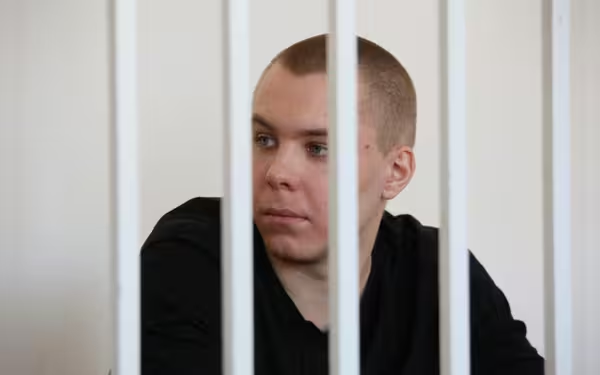Saturday, October 5, 2024 10:30 PM
Russian Man Charged With Treason After Burning Qur'an
- Nikita Zhuravel charged with treason in Russia.
- Burning Qur'an led to international outrage.
- Chechen leader's son assaults Zhuravel in custody.
 Image Credits: arabnewspk
Image Credits: arabnewspkNikita Zhuravel faces treason charges in Russia after burning the Qur'an, sparking outrage and highlighting tensions with Ukraine.
MOSCOW: A significant legal development has emerged in Russia, where a 20-year-old man named Nikita Zhuravel has been charged with treason. This follows his earlier conviction for burning a copy of the Qur’an, an act that sparked widespread outrage and drew international attention. Zhuravel was sentenced to three and a half years in prison in February under a law that protects religious beliefs in Russia.
The treason charges against Zhuravel stem from allegations that he provided sensitive military information to Ukrainian intelligence. According to the prosecutor general's office, he is accused of sending video footage of a freight train transporting warplanes, as well as details about the movements of a vehicle associated with a Russian military base. It is reported that Zhuravel voluntarily offered this information to a Ukrainian intelligence officer.
This case has not only highlighted the tensions between Russia and Ukraine but has also raised questions about the treatment of individuals accused of offenses against religious sentiments in Russia. Zhuravel's actions, particularly the burning of the Qur’an in his hometown of Volgograd, have been met with severe legal repercussions, reflecting the country's strict stance on religious matters.
Moreover, the case took a disturbing turn when Chechen leader Ramzan Kadyrov released a video showing his son, Adam, physically assaulting Zhuravel while he was in custody. This incident has drawn further scrutiny and criticism, emphasizing the harsh realities faced by those accused of crimes in regions with strong religious sentiments.
As the legal proceedings unfold, it remains to be seen how this case will impact the broader narrative of religious freedom and state security in Russia. The situation serves as a reminder of the delicate balance between individual rights and national security, particularly in a country where religious beliefs are deeply intertwined with cultural identity. The outcome of Zhuravel's treason case could set a precedent for how similar cases are handled in the future, making it a critical point of observation for both legal experts and human rights advocates.













